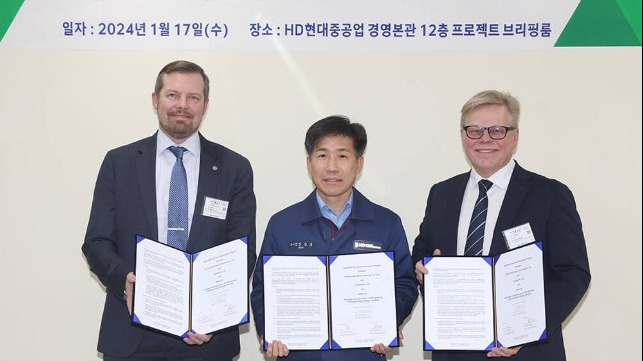HD Hyundai Heavy Industries, NAPA and Cadmatic To Develop Digital Shipyard

[By: Cadmatic]
HD Hyundai Heavy Industries, the world’s largest shipyard, has announced a joint development project (JDP) with NAPA and Cadmatic, two leading providers of smart 3D maritime design, engineering and information management software, to accelerate the digital transformation of the shipbuilding industry.
The joint project will develop a next-generation ship design and information management solution, which will also embed a product lifecycle management (PLM) system. The partnership will harness advanced 3D models and the latest developments in information management technology to create intelligent solutions to support the entire ship building process.
This will help HD Hyundai Heavy Industries implement its vision of a “digital shipyard”, where smart data and digital twins support the optimization of the design process from the early stages to construction and production, and then provide a valuable source of information throughout the ship’s lifetime at sea.
The new partnership aims to deliver high shipbuilding efficiency including shorter time schedules, lower costs, and higher quality in large and more complex shipbuilding projects via digitalization and a seamlessly integrated solution. The platform will enhance the collaboration of different shipyard departments and significantly improve information accessibility between the hundreds – if not thousands – of people involved in the ship design and building process. The goal is to optimize processes and enable error-free design for production and safe operation.
By digitalizing and optimizing the ship design and construction processes, the project will also help HD Hyundai Heavy Industries to respond to growing demand by shipowners for innovative energy-efficient designs that will support their decarbonization transition, and enhance its capability to deliver next-generation vessels, including alternative fuels or vessels equipped with new technologies such as batteries or wind propulsion.
Under the agreement, NAPA and Cadmatic will combine their extensive shipbuilding expertise in naval architecture, initial, detail and production design, as well as modern 3D-based collaboration and information management, including product lifecycle management (PLM). The technological strengths of the two software providers will be combined with HD Hyundai Heavy Industries’ experience as the world’s largest shipyard, having delivered over 2,300 ships to over 300 shipowners in its 51 years of existence.
Seung-Ho Jeon, CTO at HD Hyundai Heavy Industries, said: "At HD Hyundai Heavy Industries, we are spearheading the creation of a digital shipyard, in line with our Future of Shipyard (FOS) vision, and see this as an important area of development in the ship design and building processes. With this joint project, our ambition is to develop the next generation of intelligent design systems for digital shipbuilding. This will increase efficiency throughout the design and digital twin information delivery process, helping us deliver the innovative designs our customers demand.”
Jukka Rantala, CEO at Cadmatic, said: “This joint project represents an important milestone for shipbuilding as it enters the digital era. By combining our respective strengths and areas of expertise, this partnership is a major opportunity to enhance the role of design and information management tools in shipbuilding to support the industry’s performance via advanced digitalization. With an intelligent, integrated design and lifecycle management process, we can streamline shipbuilding processes, enhance collaboration and information accessibility in large and complex projects, and support commercial success.”
Mikko Kuosa, CEO of NAPA, said: “Shipping’s decarbonization transition is creating a sea change for shipyards, as new fuels and technologies bring an unprecedented level of complexity in the ship design process. In this context, having streamlined processes that facilitate communication and collaboration is essential to make fast-paced innovation possible, and ultimately create the new generation of vessels that will take maritime transport to net zero. To achieve this, it is critical to provide shipyards, naval architects and engineers with the right tools, making greater use of digital capabilities to enable teams to work efficiently and collaborate seamlessly as they explore new technological territories together.”
The products and services herein described in this press release are not endorsed by The Maritime Executive.

